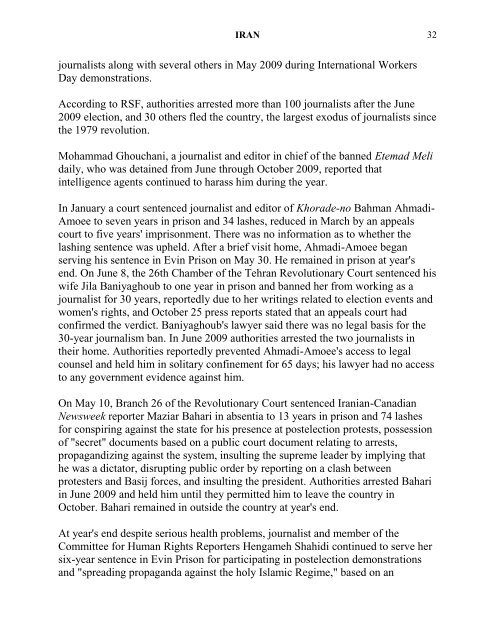IRAN* The Islamic Republic of Iran, with a population of ...
IRAN* The Islamic Republic of Iran, with a population of ...
IRAN* The Islamic Republic of Iran, with a population of ...
Create successful ePaper yourself
Turn your PDF publications into a flip-book with our unique Google optimized e-Paper software.
IRAN<br />
journalists along <strong>with</strong> several others in May 2009 during International Workers<br />
Day demonstrations.<br />
According to RSF, authorities arrested more than 100 journalists after the June<br />
2009 election, and 30 others fled the country, the largest exodus <strong>of</strong> journalists since<br />
the 1979 revolution.<br />
Mohammad Ghouchani, a journalist and editor in chief <strong>of</strong> the banned Etemad Meli<br />
daily, who was detained from June through October 2009, reported that<br />
intelligence agents continued to harass him during the year.<br />
In January a court sentenced journalist and editor <strong>of</strong> Khorade-no Bahman Ahmadi-<br />
Amoee to seven years in prison and 34 lashes, reduced in March by an appeals<br />
court to five years' imprisonment. <strong>The</strong>re was no information as to whether the<br />
lashing sentence was upheld. After a brief visit home, Ahmadi-Amoee began<br />
serving his sentence in Evin Prison on May 30. He remained in prison at year's<br />
end. On June 8, the 26th Chamber <strong>of</strong> the Tehran Revolutionary Court sentenced his<br />
wife Jila Baniyaghoub to one year in prison and banned her from working as a<br />
journalist for 30 years, reportedly due to her writings related to election events and<br />
women's rights, and October 25 press reports stated that an appeals court had<br />
confirmed the verdict. Baniyaghoub's lawyer said there was no legal basis for the<br />
30-year journalism ban. In June 2009 authorities arrested the two journalists in<br />
their home. Authorities reportedly prevented Ahmadi-Amoee's access to legal<br />
counsel and held him in solitary confinement for 65 days; his lawyer had no access<br />
to any government evidence against him.<br />
On May 10, Branch 26 <strong>of</strong> the Revolutionary Court sentenced <strong>Iran</strong>ian-Canadian<br />
Newsweek reporter Maziar Bahari in absentia to 13 years in prison and 74 lashes<br />
for conspiring against the state for his presence at postelection protests, possession<br />
<strong>of</strong> "secret" documents based on a public court document relating to arrests,<br />
propagandizing against the system, insulting the supreme leader by implying that<br />
he was a dictator, disrupting public order by reporting on a clash between<br />
protesters and Basij forces, and insulting the president. Authorities arrested Bahari<br />
in June 2009 and held him until they permitted him to leave the country in<br />
October. Bahari remained in outside the country at year's end.<br />
At year's end despite serious health problems, journalist and member <strong>of</strong> the<br />
Committee for Human Rights Reporters Hengameh Shahidi continued to serve her<br />
six-year sentence in Evin Prison for participating in postelection demonstrations<br />
and "spreading propaganda against the holy <strong>Islamic</strong> Regime," based on an<br />
32

















